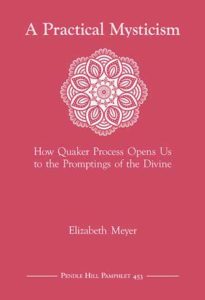A Practical Mysticism: How Quaker Process Opens Us to the Promptings of the Divine
Reviewed by Marty Grundy
March 1, 2019
 By Elizabeth Meyer. Pendle Hill Pamphlets (number 453), 2018. 36 pages. $7/pamphlet.
By Elizabeth Meyer. Pendle Hill Pamphlets (number 453), 2018. 36 pages. $7/pamphlet.
Buy from QuakerBooks
This Pendle Hill pamphlet is an excellent explanation and guide to Friends’ way of conducting the business of our meetings because it emphasizes our connection with the Divine. That is the original purpose of our process: to create a method that is predicated on corporate listening for Divine guidance. Meyer points out that for “business meetings to be truly worshipful, all present must engage faithfully, trusting the process.” She then spells out 12 steps to this process—steps it behooves each of us individually and in our meetings to read and ponder carefully.
First is the point that the “Clerk is the Shepherd of the Process.” The emphasis is on the process, not the results. We need to recalibrate away from the secular world into the paradigm of seeking to discern and obey the will of God as we sense it together. To facilitate this, the clerk tends to both the “worshipful nature of the work” and the “blessed community” in which each Friend is included in the process.
Meyer illustrates some of her points with stories from her own experience of clerking. She stresses the need to speak with kindness, and to listen carefully to one another with cell phones turned off. She reiterates the importance of having written reports prepared in advance, and advises that any submitted report is turned over to the meeting and no longer “owned” by the submitter or committee. Humility in offering one’s efforts, rather than defending one’s turf or opinions, is critical.
Meyer faces the sticky issues with clarity. Unity does not require unanimity. Wrestling with thorny issues again and again over time can be transformational—rather than a sign of failure—because they require deeper worship, more effort at letting go of our own need to be right. We can learn that the meeting’s sense of God’s will can be accepted even if we do not like it, because our faith community is more important than being personally right. It is helpful to remember that Friends worship the Living God rather than Quakerism with its beloved and seemingly quirky traditions and practices.
It is also helpful to remember that done in right order, Quaker process fosters love, and love facilitates unity. Every meeting for business is an opportunity to teach and learn Quaker process. How can we stay away?
Meyer concludes with some helpful advice for clerks. My only quibble is her instruction to “Be sure the minutes reflect all concerns; this signals that all views are respected.” It is only within my lifetime that minutes have attempted to do this, as we have moved toward a secular “democratic” process. In earlier times, the minutes included various tasks or services that were assigned and any decisions that were made. The arguments and opinions preceding the decision were deemed unimportant compared to the sense of the meeting, when that had been discerned. An issue could be laid-over time after time, but the old minutes do not spell out the wrangles. The underlying assumption was theocracy: we meet together to discern the Divine will for us on a specific agenda at a specific time. Each Friend who speaks may offer a piece of that Divine will; it is discerning the will that is important, not who said which part of it.
The pamphlet ends with some thoughtful discussion questions. It would be a good exercise for meetings to consider these questions together.



Comments on Friendsjournal.org may be used in the Forum of the print magazine and may be edited for length and clarity.